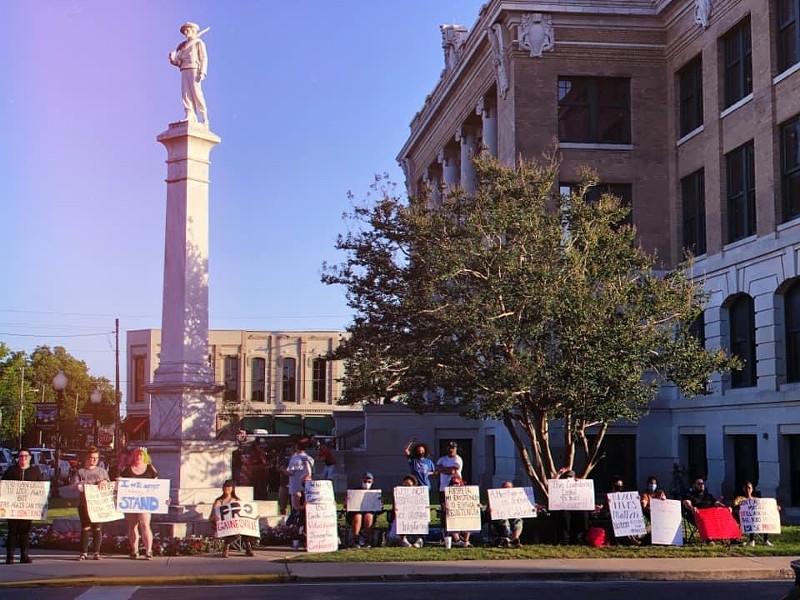Activists from grassroots organization PRO Gainesville say the Confederate statue, which towers over the courthouse lawn, is a testament to white supremacist ideals. The group’s founder, Torrey Henderson, said although she was not surprised by the commissioners’ vote, she still felt “extreme disappointment.”
“When it comes to our community, it just kind of feels like they’re still going to hold onto these neo-Confederate emblems and they’re not wanting to progress,” she said. “It’s terrible.”
An engraving on the courthouse monument's base reads:
“No nation rose so white and fair,
None fell so pure of crime.”
Protests over the killing of George Floyd by Minneapolis police renewed calls for Confederate monuments to be dismantled nationwide. While some view the movement as long overdue, others believe that such memorials should stay.
During Monday’s specially called meeting, civilians spoke both for and against the statue’s removal, according to the Gainesville Daily Register. Four commissioners voted for the motion to remain; Cooke County Judge Jason Brinkley dissented.
Brinkley told the Observer that he’d proposed putting the issue on a ballot for a nonbinding referendum. He said he wanted to allow people on either side of the issue to have a say.
Henderson said that she appreciates the sentiment behind Brinkley’s vote, but a referendum likely wouldn’t help PRO Gainesville’s cause. As of 2019, Black people make up only 3.6% of Cooke County’s population, according to the U.S. Census Bureau.
Although he was outvoted, Brinkley said he respects the decision of the commissioners court.
“The broader conversation of race is one that we need to continue to have as a community,” he said. “But I hope we can … move our community forward collectively, in a positive way.”
Commissioners Gary Hollowell, John Klement, Leon Klement and Jason Snuggs did not respond to requests for comment.
Gainesville is the nation’s only host city for the Medal of Honor Host City Program, according to the organization’s website. The Medal of Honor is the U.S. military's highest decoration for valor in action, and each year the town hosts award recipients to promote patriotism.
As such, Gainesville has earned accolades as “the most patriotic town in America.” But Henderson said that considering the commissioners’ decision to keep the Confederate monument, the nickname may not fit.
“Gainesville prides itself on that title, and I got a lot of backlash because I mentioned that I felt like we need to choose patriotism over the Confederacy,” Henderson said. “But if that’s what we want for our community, then do we deserve to be [called] ‘the most patriotic town in America?’”
Following the meeting, PRO Gainesville demonstrators and their supporters protested outside Gainesville’s courthouse, Henderson said. Counterprotesters also appeared, and police helped keep tempers in check.“They had to choose a side, and they did. They told Black residents that their lives don’t matter.” - Activist and scholar Jessica Luther Rummel
tweet this
In cell phone videos, protesters can be heard chanting “Racism is not OK.” Henderson said the town’s Confederate statues are racist because they were built to glorify white supremacy.
The positioning of the monuments also matters, she said. One was built at the entrance of Leonard Park, which she said historically only allowed white people entry. The other was erected at the courthouse during a time when Black people were targets of voter suppression.
The United Daughters of the Confederacy, a hereditary group of women with ties to Confederate soldiers, had donated both statues in the early 20th century. That group's history has proven racist ties; a 1914 book titled The Ku Klux Klan or The Invisible Empire reveals it was unanimously endorsed by the UDC.
The novel's dedication is just as damning.
“This book is dedicated by the author to the Youth of the Southland, hoping that a perusal of its pages will inspire them with respect and admiration for the Confederate soldiers, who were the real Ku Klux Klan, and whose deeds of courage and valor, have never been surpassed, and rarely equalled, [sic] in the annals of history,” it reads.
The KKK is one of the country's oldest and most infamous hate groups.
Activist Jessica Luther Rummel is a University of North Texas doctoral student who has researched the region’s white supremacy ties for the past three years. In her thesis, she outlines an event that occurred in Gainesville in 1862 called “The Great Hanging,” during which at least 40 suspected Union sympathizers were hung as traitors to the Confederacy.
Gainesville has long had ties to the KKK, Henderson said. In 1923, a newspaper reported that several thousand robed Klan members paraded through the town, joined by a crowd of 18,000–20,000.
With that history as context, Luther Rummel called Monday’s vote “remarkable.” She said that the commissioners signaled to Black residents that monuments to white supremacy are more important than their feeling safe in their own community.
“They had to choose a side, and they did,” Luther Rummel said. “They told Black residents that their lives don’t matter.”
Joining the protest was Willie Hudspeth, president of Denton’s NAACP. For 21 years, he had protested for the removal of the Confederate monument outside Denton’s Courthouse-on-the-Square museum.
Denton County Commissioners voted to relocate it this summer.
Through her work, Luther Rummel also helped sway public opinion in favor of that statue’s removal, which she said commissioners had previously voted against 12 times.
Hudspeth said that Monday's meeting reminded him of his fight to have Denton’s statue dismantled. Although he said he was disappointed by the decision, he remains optimistic that Cooke County will eventually follow suit.
“I really do think it’s going to happen,” he said. “They’re getting there.”














